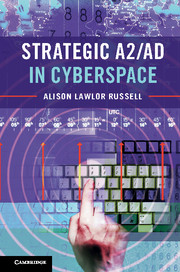1 - Introduction
Published online by Cambridge University Press: 24 March 2017
Summary
The Information Age of the twenty-first century is distinguished by the proliferation of networks of power that transmit information in a variety of forms and have the effect of defining and decentralizing power relationships. The instantaneous transmission of information through vast geographic space has made possible our current global economic system, as well as the operations of modern governments, militaries, and social organizations. Their capabilities hinge on the accessibility of cyberspace to all participants. To be absent from these networks of information is to be absent from power.
Cyberspace is the modern communications network that underpins global information exchange and services. It is ubiquitous, complex, and much bigger than the Internet alone. It reinforces the global economic order and is essential to all elements of state power, from military operations to electricity to basic communications. Old networks, such as landline-based telephone systems, have been integrated into the newer and more efficient networks of cyberspace. Cyberspace is so ubiquitous that large-scale, strategic connectivity is rarely questioned.
Nevertheless, connectedness to cyberspace should not be taken for granted, especially by states. Cyberspace is a man-made network to which a state can be connected and disconnected, sometimes against its will. Cyber blockades can occur, and states can be denied access to cyberspace. The experience of North Korea in December 2014 illustrated just how quickly and completely a state can be denied access to cyberspace. For nine-and-a-half hours on December 22, North Korea suffered a total outage of Internet connectivity. The event was consistent with a cyber attack, and it came just days after the US Federal Bureau of Investigation said that North Korea was responsible for a major cyber attack on Sony Pictures. However, experts cautioned that North Korea's outage could also be attributed to other causes, such as power problems.
Deliberate actions to deny a state access to cyberspace and/or diminish its capacity to operate freely therein may be considered anti-access and area denial operations (or A2/AD operations). According to the modern understanding of A2/AD operations, they specifically mean to deny an adversary the ability to bring its operational capabilities into the contested region or prevent the attacker from operating freely within the region and maximizing its capabilities.
- Type
- Chapter
- Information
- Strategic A2/AD in Cyberspace , pp. 1 - 10Publisher: Cambridge University PressPrint publication year: 2017



